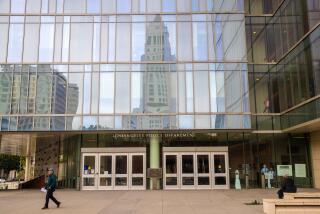Ferguson plan for police oversight board is derided as ‘insulting’
A proposal for greater citizen oversight of the Ferguson Police Department has been criticized as “weak” and “insulting” by police experts and St. Louis-area officials who examined the plan Thursday, while others say it is a positive step forward that needs more work.
The Ferguson, Mo., City Council this week emerged from a month of quiet after the fatal police shooting of 18-year-old Michael Brown with a proposal to create a new citizens’ review board for the town’s predominantly white Police Department, which has become reviled by Ferguson’s predominantly black residents.
Many community members and the St. Louis County branch of the NAACP demanded the creation of such a board after weeks of unrest and citizen anger over police use of force, traffic stops and militarized crowd-control tactics during mostly peaceful demonstrations over the shooting of the unarmed Brown.
The New York and Los Angeles police departments have civilian oversight boards, as do departments in larger Missouri cities including Kansas City, Springfield and Columbia. More than 100 such boards exist around the country, according to a 2013 tally by researchers at Cal State Fullerton.
“The overall goal of these changes is to improve trust within the community and increase transparency, particularly within Ferguson’s courts and police department,” council member Mark Byrne said in a statement announcing the proposal.
However, several experts and St. Louis-area officials say there’s a problem: The text of the bill does not appear to give explicit authority to the review board to receive and review citizen complaints against Ferguson police officers.
The ability to independently investigate or review complaints is a key feature of many police oversight boards around the country, where high-profile controversies involving the use of force have typically led to their creation, experts said.
Though such boards are often welcomed by citizens, experts are mixed on their effectiveness. The panels vary in power, independence and ability to investigate complaints. New York City’s Civilian Complaint Review Board has subpoena power and its own staff investigators, and it issues at least 14 public reports a year. The board, as is typical with others, can only make recommendation’s to the city’s police commissioner, not directly punish officers.
As a result, many police departments, including New York’s, have fallen under criticism for not heeding the recommendations of their civilian overseers.
A spokesman for Ferguson, Devin James, said in an email that the city’s new police review board will be able to review complaints against the Police Department. However, James did not respond when asked which part of the council’s proposed ordinance would allow the review board to do so. He said the city’s mayor and council members were not available for comment Thursday because they were attending a funeral.
The council bill that described the proposal calls for a board to include two unpaid citizens from each of the Ferguson’s three wards, the mayor or a designee of the mayor, and one City Council member. Ferguson’s police chief, municipal judge and prosecutor would also be nonvoting members of the board. Citizens would be appointed by the mayor with City Council approval, and meetings would be held at the mayor’s discretion.
The board would have an “advisory capacity” for department “policy matters,” including making recommendations on city traffic enforcement. The proposal also says that “the board shall perform such other services as may be assigned or directed by the Mayor and City Council,” without elaborating.
The proposal does not mention whether the board would be empowered to investigate citizen complaints against officers, given resources to conduct independent investigations. The word “review” is not mentioned in the proposal other than to describe the committee as a “review board.”
“No power to collect information. No public meetings to allow citizen input. Not even clear that meetings are public,” said Sam Walker, professor emeritus at the University of Nebraska in Omaha and an expert on police accountability. After reading the review board proposal, he called it “probably the weakest I have seen in years.”
“This would be different and far, far weaker than the usual civilian review board. I don’t know what they do,” said Merrick Bobb, executive director of the Police Assessment Resource Center, and the independent monitor overseeing the Seattle Police Department. “It does not deserve the name of a civilian oversight body or civilian review board.”
Antonio French, a St. Louis alderman who has become deeply involved with the demonstrations in Ferguson, described the proposal as “weak — to the point of being insulting.”
“From my experience, if it lacks subpoena power and/or paid staff and investigators, it’s not going to be effective,” French said by email.
Not all of the reception to the proposal has been damning. John Gaskin III, a member of the national board of the National Assn. for the Advancement of Colored People and a spokesman for the county NAACP branch, called the proposal “a step in the right direction.” However, he said he wanted more details.
“If this is a city that is not operating in the most kosher way on a day-to-day operating basis, what makes people think ... the policies they put in place are going to be effective?” Gaskin said, alluding to recent questions over whether the City Council may have broken state law by coming up with the new proposals outside of a public meeting.
Jeffrey Mittman, executive director of the American Civil Liberties Union of Missouri, agreed in calling the review board proposal “a good first step.”
He added, however: “Would it be beneficial if there are specific proposals in the ordinance that codify the ways in which the public can bring matters to a review board’s attention, the Police Department’s attention, the city’s attention? I think the matter is a resounding yes.”
The City Council gave its first public reading of the bill at a raucous Tuesday meeting, and could vote on the measure on Sept. 23.
More to Read
Start your day right
Sign up for Essential California for news, features and recommendations from the L.A. Times and beyond in your inbox six days a week.
You may occasionally receive promotional content from the Los Angeles Times.







